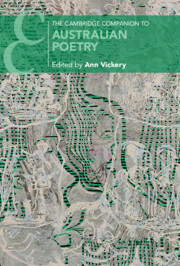Book contents
- The Cambridge Companion to Australian Poetry
- The Cambridge Companion to Australian Poetry
- Copyright page
- Contents
- Figures
- Contributors
- Acknowledgements
- Chronology
- Introduction
- Part I Change and Renewal
- Part II Networks
- Part III Authors
- Part IV Embodied Poetics
- 13 The Strength of Us as Women
- 14 “Country Snarled / in Borders”
- 15 Australian Poets in the Countries of Others
- 16 Writing the Body
- 17 Not the Poem Alone
- Part V Expanding Form
- Further Reading
- Index
- Cambridge Companions To …
- References
15 - Australian Poets in the Countries of Others
from Part IV - Embodied Poetics
Published online by Cambridge University Press: 06 June 2024
- The Cambridge Companion to Australian Poetry
- The Cambridge Companion to Australian Poetry
- Copyright page
- Contents
- Figures
- Contributors
- Acknowledgements
- Chronology
- Introduction
- Part I Change and Renewal
- Part II Networks
- Part III Authors
- Part IV Embodied Poetics
- 13 The Strength of Us as Women
- 14 “Country Snarled / in Borders”
- 15 Australian Poets in the Countries of Others
- 16 Writing the Body
- 17 Not the Poem Alone
- Part V Expanding Form
- Further Reading
- Index
- Cambridge Companions To …
- References
Summary
The chapter outlines the mid-twentieth century debate over an Athenian-Boeotian divide in Australian literature, which extended an earlier false dichotomy between city and the bush through distinguishing between the expatriate and the writer who stays at home. Despite a global dispersion of Australian writers, it argues that most scholarship has tended to focus on those in Britain. The chapter discerns that the racialisation underscoring who is generally considered ‘expatriate’ renders the term problematic and that many Australian diasporic poets define themselves through other means. It also finds that many experience feelings of shame, anger, and guilt over the colonial violence shaping Australia. The chapter considers the development of Lola Ridge’s poetics while in Australia before considering Oodgeroo Noonuccal’s poem “Yussef (Hi-Jack),” written during a hijacking of her plane by Palestinian militants, and the poetry Oodgeroo wrote in China. The chapter foregrounds the significance of First Nations mobility, engaging with the London writing of Aboriginal activist A. M. Fernando in the 1920s and writing of recent poets like Ellen Van Neerven.
- Type
- Chapter
- Information
- The Cambridge Companion to Australian Poetry , pp. 252 - 273Publisher: Cambridge University PressPrint publication year: 2024

